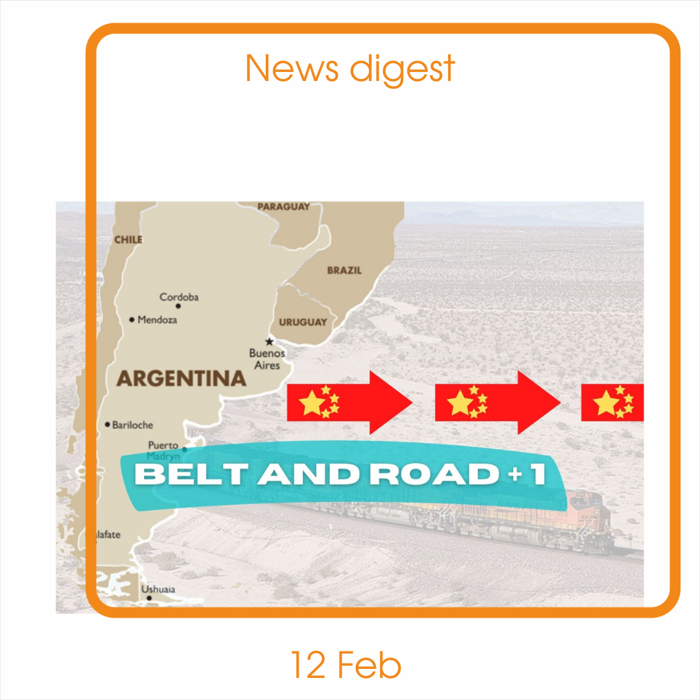News digest. 12 Feb
“Where big sports go, investments flow” is the axiom for the upcoming Winter Olympics. For many, it is the opportunity for further infrastructure boost.
Big sporting events are not only about athletic excellence, but also about infrastructure improvements, and the upcoming Winter Olympics in Beijing is no exception. In the wake of the event, Argentina has been incorporated in The Belt and Road initiative in the framework of which the country will receive significant investments in its transportation sector. China will share the development of the opportunities. The pacific tiger has also announced its willingness to take an active part in the construction of a logistics hub in Poland and help Poland become a key node in the China-Europe supply chain. In addition, China is planning to focus on its relations with Pakistan, in particular on the China-Pakistan Economic Corridor investment program to build roads, power plants, and other infrastructure.
Besides the rail sector that has seen a glimpse of light in the past week, it seems like at sea there is a subtle breeze of change as well. Finally, after months of overcrowded ports in North America, there is an improvement. Thanks to the closure of factories in Asia for the Lunar New Year holiday, the terminals have had an opportunity to reduce congestion. For the first time since November, the number of ships waiting at berths at the Port of LA has dropped to 80, which corresponds to a 77% reduction, while at the Port of Long Beach there is a 56% reduction of waiting vessels. The spot rates did not take long to react and showed a slight drop. Big players are alarmed and quick to secure the majority of their volume under long-term contracts. The thing is, many have introduced carriers offering sailings with space guarantees when the rates were high, and if they fall back to around $10,000 per 40ft, the services would struggle to break even on voyage round-trips. Experts already started saying that the days of the ad-hoc carriers are numbered.
With a slowly improving flow of cargo, the question of demurrage and detention fees has flown to the surface. These charges are still, to some extent, a gray area, hence FMC has proposed to consider any charges assessed by common carriers and marine terminal operators using terminal space or shipping containers as demurrage and detention ones. The initiative obviously targets new regulations of ocean carriers. The commission is currently collecting feedback on what information must be listed in the bills. In turn, industry players react by stating that the government overlooks the roots of the problem - lack of capacity and soaring demand - and new legislation will only make congestion worse. Meanwhile, terminals are experiencing a major boom in profits. Big companies have managed to benefit from it because operating costs rose at a smaller magnitude than revenue, which meant more money was flowing to them. Potentially the comfortable position may result in further consolidation of the major allies, to the dismay of FMC. At the same time, such giants as Maersk are not missing further opportunities to expand the sector of their specialization and extend its integrated logistics offering. The company is going to acquire Pilot Freight Services and get a grip of a booming e-commerce sector.
In Indonesia, maritime authorities also dive into co-operation with Singapore for the sake of the development of human resources and environmental protection. Among the latest breakthroughs of the latter - environmental initiatives - is CMA CGM Group’s commitment to drop plastic from vessels, it will no longer be transported. The company has become a pioneer, setting the tone for the industry.
Among all the proclaimed sustainable plans, there was an intention to transport more goods by rail. France calls presidential candidates for the upcoming election to take a stand on this objective. Industry representatives talk about more investment. In general, European rail is in need of financial support especially since in 2021 the overall losses have amounted to 4 billion euros. The Hungarian government is going to invest 35 million euros in the region bordering Ukraine, right after Russia’s commitment to bypass Budapest. Hungary plans to strengthen its position on the railway roadmap. Britain’s focus on rail continues to pay off. There is now a new bulk flow operated by GB Railfreight, which is the next step on the way to improving the local economy. In the meantime, CLdN Cargo brings the Netherlands and Itay together by launching its own intermodal rail connection. For Italy, it is a great opportunity to break into the market.

